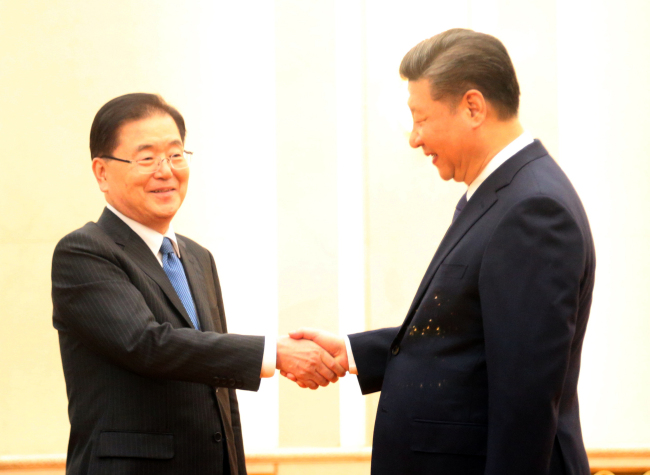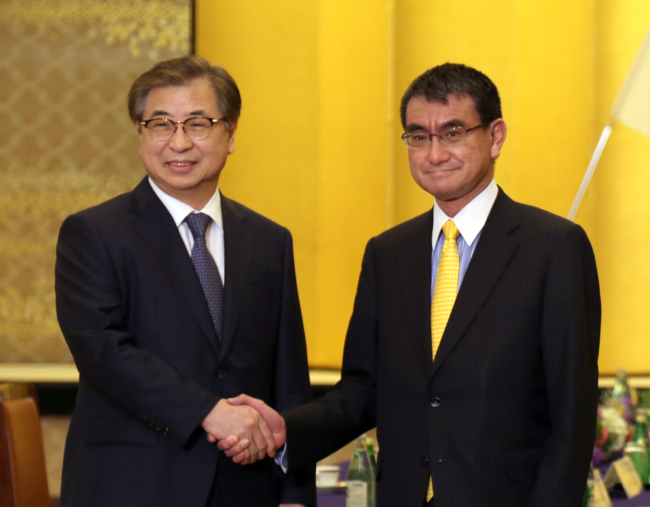Seoul’s top national security officials on Monday left for China and Japan to brief the two countries’ leaders on the recent developments surrounding North Korea.
National Security Office chief Chung Eui-yong and National Intelligence Service Director Suh Hoon, headed to Beijing and Tokyo, respectively, tasked with explaining their meetings with North Korean leader Kim Jong-un and US President Donald Trump.
 |
| Chinese President Xi Jinping greets Seoul’s National Security Office chief Chung Eui-yong in Beijing on Monday. Yonhap |
Chung and Suh met Kim in Pyongyang on March 5, and then with Trump in Washington on Friday. After returning from Pyongyang, Chung announced that Kim agreed to halt missile and nuclear tests while dialogue with the South is ongoing, and to meet with President Moon Jae-in at the end of April.
Chung also said that Kim expressed willingness to engage Washington to discuss denuclearization and Washington-Pyongyang relations.
Following the meeting with Trump, Chung announced at the White House that the US leader agreed to meet with Kim by May, after the inter-Korean summit planned for late April.
Chung, who was Moon’s chief special envoy to Pyongyang, was scheduled to meet with Chinese President Xi Jinping late Monday afternoon. From Beijing, Chung will head to Moscow, where he will meet with Russian officials to discuss related issues.
Ahead of the meeting with Xi, Chung met with China’s State Councilor Yang Jiechi, who welcomed the developments, and reiterated Beijing’s support for seeking resolution through dialogue.
Of the countries involved in the six-party talks on denuclearization, China and Russia have taken the least harsh approach, stressing the need for dialogue. The two countries have also been instrumental in foiling the US-led drive to impose a complete oil embargo on North Korea.
 |
| National Intelligence Service Director Suh Hoon (left) shakes hands with Japan’s Foreign Minisger Taro Kono in Tokyo on Monday. Yonhap |
As for Suh, who is accompanied by National Security Office Second Deputy Director Nam Gwan-pyo, he was to begin his trip with a meeting with Japan’s Foreign Minister Taro Kono, and meet with Japanese Prime Minister Shinzo Abe on Tuesday.
At Tokyo’s Haneda Airport, Suh declined to comment on his trip, saying only that he will “faithfully explain” the developments to the Japanese government that hopes to glean an insight into Kim’s intentions.
The Abe administration, which focuses on pressure in dealing with North Korea, is taking a cautious approach to recent developments.
After Chung’s trip to Pyongyang, Abe raised the possibility that Kim may be attempting to buy time with offers of dialogue, and said that Pyongyang must take concrete steps toward denuclearization.
By Choi He-suk (cheesuk@heraldcorp.com)

